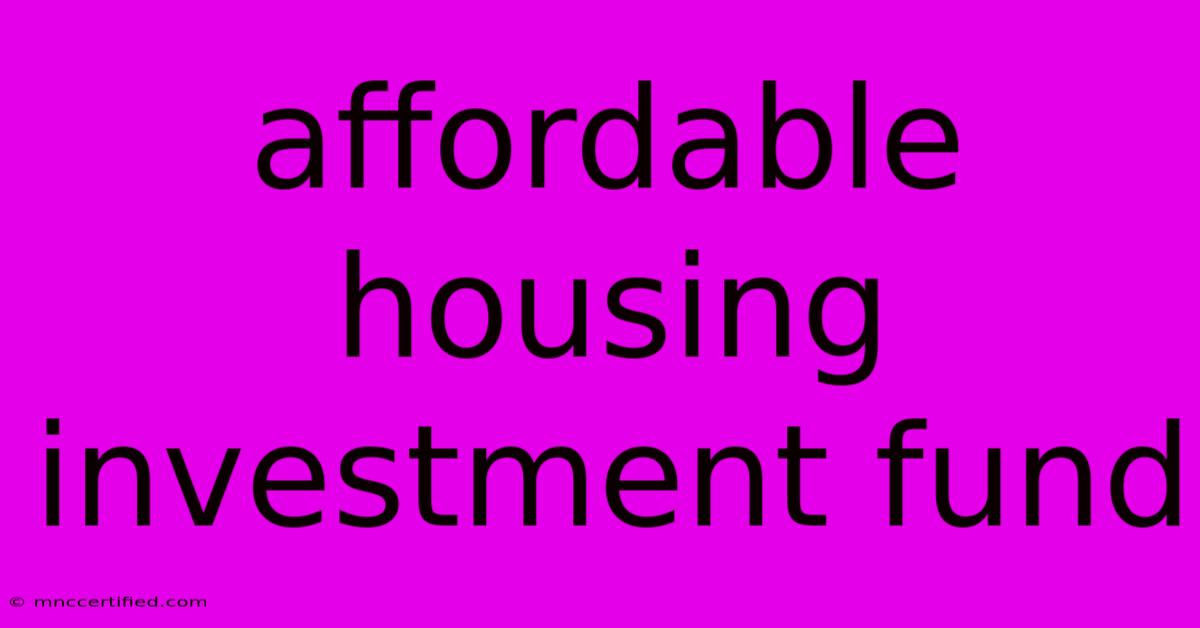Affordable Housing Investment Fund

Table of Contents
Affordable Housing Investment Funds: A Smart & Socially Responsible Investment
Investing in affordable housing might not be the first thing that springs to mind when you think of lucrative investment opportunities. However, affordable housing investment funds are increasingly attracting attention from both socially conscious investors and those seeking strong, stable returns. This article will delve into what these funds are, how they work, the potential benefits, and the factors to consider before investing.
What are Affordable Housing Investment Funds?
Affordable housing investment funds are pooled investment vehicles that specifically allocate capital towards the development, preservation, and operation of affordable housing units. These funds can take various forms, including:
- Real Estate Investment Trusts (REITs): These publicly traded companies invest in income-producing real estate, including affordable housing properties. REITs offer investors a relatively easy way to participate in the market.
- Private Equity Funds: These funds are typically less accessible to the average investor, requiring a higher minimum investment. They often focus on larger-scale projects and offer potentially higher returns, but also carry higher risk.
- Community Development Financial Institutions (CDFIs): CDFIs are mission-driven organizations that provide financing for affordable housing projects in underserved communities. Investing in a CDFI may offer a blend of social impact and financial return.
Why Invest in Affordable Housing?
Investing in affordable housing presents a compelling proposition for several reasons:
Strong Returns:
Despite the social impact focus, these investments can deliver competitive returns. Stable rental income streams, especially in areas with high demand for affordable housing, can lead to consistent cash flow. Furthermore, appreciating property values can generate substantial capital gains over the long term.
Socially Responsible Investing (SRI):
For investors seeking alignment between their financial goals and social values, affordable housing provides a powerful way to make a positive impact. You're directly contributing to addressing a critical social issue – the housing crisis – while generating a return on your investment.
Diversification:
Affordable housing can serve as a valuable diversification tool within a broader investment portfolio. Its performance tends to be less correlated with traditional asset classes, potentially reducing overall portfolio volatility.
Government Incentives and Tax Benefits:
Many governments offer incentives and tax benefits to encourage investment in affordable housing. These can significantly enhance the financial attractiveness of such investments. Research specific incentives available in your region.
Risks to Consider
While promising, investing in affordable housing funds carries some risks:
- Illiquidity: Accessing your investment may be challenging, particularly with private equity funds, as they typically have longer lock-up periods.
- Market Volatility: While generally less volatile than other asset classes, affordable housing investments are still subject to market fluctuations, impacting returns.
- Regulatory Changes: Changes in government regulations and policies related to affordable housing can affect the profitability of these investments.
- Management Risk: The success of the investment heavily relies on the expertise and competence of the fund manager.
Choosing the Right Affordable Housing Investment Fund
Selecting the right fund requires careful consideration of several factors:
- Fund Strategy: Understand the fund's investment strategy, target market, and risk profile.
- Track Record: Review the fund manager's past performance and experience in the affordable housing sector.
- Fees and Expenses: Carefully evaluate all fees associated with the investment, including management fees and performance fees.
- Alignment with your Investment Goals: Ensure the fund aligns with your financial objectives and risk tolerance.
- Due Diligence: Conduct thorough research and, if necessary, seek professional financial advice before making any investment decision.
Conclusion: A Powerful Investment Choice
Affordable housing investment funds present a unique opportunity to combine financial returns with social impact. By understanding the various types of funds, potential benefits, and inherent risks, you can make informed decisions that align with your investment goals and values. Remember to conduct thorough due diligence and seek professional advice when needed. Investing in affordable housing is not just about profit; it's about building a more equitable and sustainable future.

Thank you for visiting our website wich cover about Affordable Housing Investment Fund. We hope the information provided has been useful to you. Feel free to contact us if you have any questions or need further assistance. See you next time and dont miss to bookmark.
Featured Posts
-
Defensive Comms Kellys Explanation
Nov 17, 2024
-
Jones Vs Miocic Ufc 309 Fight Result
Nov 17, 2024
-
Clemson Vs Pittsburgh Tv Channel And Stream
Nov 17, 2024
-
De Aaron Foxs Record Breaking Game
Nov 17, 2024
-
Karoline Leavitt New Press Secretary
Nov 17, 2024